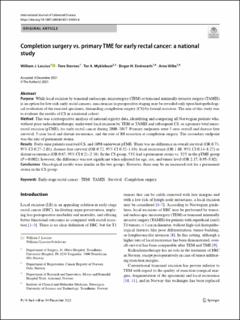Completion surgery vs. primary TME for early rectal cancer: a national study
Journal article, Peer reviewed
Published version
Permanent lenke
https://hdl.handle.net/11250/2982346Utgivelsesdato
2021Metadata
Vis full innførselSamlinger
Sammendrag
Purpose While local excision by transanal endoscopic microsurgery (TEM) or transanal minimally invasive surgery (TAMIS) is an option for low-risk early rectal cancers, inaccuracies in preoperative staging may be revealed only upon histopathological evaluation of the resected specimen, demanding completion surgery (CS) by formal resection. The aim of this study was to evaluate the results of CS in a national cohort. Method This was a retrospective analysis of national registry data, identifying and comparing all Norwegian patients who, without prior radiochemotherapy, underwent local excision by TEM or TAMIS and subsequent CS, or a primary total mesorectal excision (pTME), for early rectal cancer during 2000–2017. Primary endpoints were 5-year overall and disease-free survival, 5-year local and distant recurrence, and the rate of R0 resection at completion surgery. The secondary endpoint was the rate of permanent stoma. Results Forty-nine patients received CS, and 1098 underwent pTME. There was no diference in overall survival (OR 0.73, 95% CI 0.27–2.01), disease-free survival (OR 0.72, 95% CI 0.32–1.63), local recurrence (OR 1.08, 95% CI 0.14–8.27) or distant recurrence (OR 0.67, 95% CI 0.21–2.18). In the CS group, 53% had a permanent stoma vs. 32% in the pTME group (P=0.002); however, the diference was not signifcant when adjusted for age, sex, and tumor level (OR 2.17, 0.95–5.02). Conclusions Oncological results were similar in the two groups. However, there may be an increased risk for a permanent stoma in the CS group.

